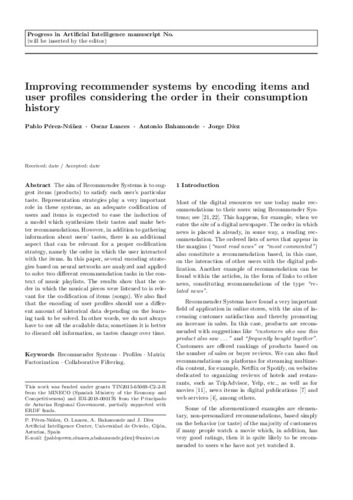Improving recommender systems by encoding items and user profiles considering the order in their consumption history
Autor(es) y otros:
Palabra(s) clave:
Matrix factorization
Collaborative filtering
Fecha de publicación:
Editorial:
Springer
Versión del editor:
Citación:
Resumen:
The aim of Recommender Systems is to suggest items (products) to satisfy each user’s particular taste. Representation strategies play a very important role in these systems, as an adequate codification of users and items is expected to ease the induction of a model which synthesizes their tastes and make better recommendations. However, in addition to gathering information about users’ tastes, there is an additional aspect that can be relevant for a proper codification strategy, namely the order in which the user interacted with the items. In this paper, several encoding strategies based on neural networks are analyzed and applied to solve two different recommendation tasks in the context of music playlists. The results show that the order in which the musical pieces were listened to is relevant for the codification of items (songs). We also find that the encoding of user profiles should use a different amount of historical data depending on the learning task to be solved. In other words, we do not always have to use all the available data; sometimes, it is better to discard old information, as tastes change over time
The aim of Recommender Systems is to suggest items (products) to satisfy each user’s particular taste. Representation strategies play a very important role in these systems, as an adequate codification of users and items is expected to ease the induction of a model which synthesizes their tastes and make better recommendations. However, in addition to gathering information about users’ tastes, there is an additional aspect that can be relevant for a proper codification strategy, namely the order in which the user interacted with the items. In this paper, several encoding strategies based on neural networks are analyzed and applied to solve two different recommendation tasks in the context of music playlists. The results show that the order in which the musical pieces were listened to is relevant for the codification of items (songs). We also find that the encoding of user profiles should use a different amount of historical data depending on the learning task to be solved. In other words, we do not always have to use all the available data; sometimes, it is better to discard old information, as tastes change over time
ISSN:
Patrocinado por:
This work was funded under Grants TIN2015-65069-C2-2-R from the MINECO (Spanish Ministry of the Economy and Competitiveness) and IDI-2018-000176 from the Principado de Asturias Regional Government, partially supported with ERDF funds
Colecciones
- Artículos [37541]
- Informática [875]
- Investigaciones y Documentos OpenAIRE [8416]
Ficheros en el ítem




